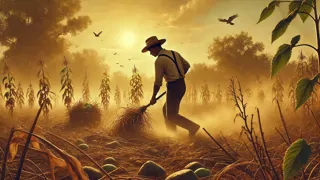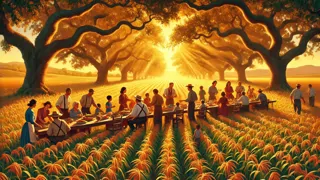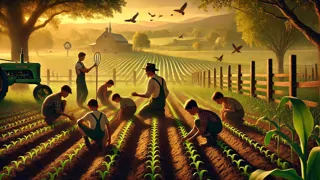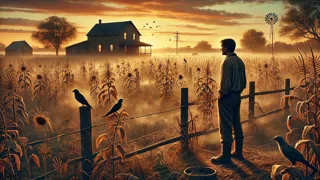Introduction
In the heart of a sun-warmed valley where cottonwoods lined the meandering river and old barns creaked their secrets to the wind, Miguel Ramos walked the same rutted path each day, boots powdered with dust, dreams heavy as seed sacks. Miguel was the sort of man others forgot at a gathering—quiet, slight, with a gentle smile and hands scarred by work no one paid him to do. He spent his hours tending other people’s fields, stooping low to weed or mend fences, earning just enough to keep bread on the table he shared with his widowed mother. Yet when dusk fell and fields emptied, Miguel would linger alone beneath the wild oaks, his gaze fixed not on the farmhouses clustered in comfort but on the long, tangled lot where nothing grew but weeds and brambles. That land, left untended for a decade and ringed with stones, called to him as surely as the harvest birds called to each other at sunset. At night, those birds would gather atop the fenceposts—rust-red and bright-eyed—filling the air with a music that seemed both prayer and promise. Some folks laughed at Miguel’s yearning. “Why try what’s never been done?” they’d say, shaking their heads as if dreams were a kind of illness. But Miguel wasn’t discouraged. Each morning, he let the birds’ chorus root itself in his heart, a melody of persistence threading through his sleep and waking him to the possibility that tomorrow could be different. All it takes, he’d tell himself, is a patch of earth, a pocketful of hope, and the stubbornness to begin.
A Patch of Earth and a Promise
The offer came as a passing joke. Old Don Morales, landlord and town wit, pointed at the neglected field as he paid Miguel for a day’s work and grinned. “No one’s tamed that land for years. It’s stubborn as a mule and twice as ornery. You want it? Try your luck, boy.” Laughter rippled through the bystanders—neighbours who’d seen fields like this swallow hope whole. But Miguel met Don’s gaze, his brown eyes steady. “Yes, I’ll try.” The words felt like the first stone laid on a bridge no one else could see.

Miguel set to work with the tools he’d borrowed and the faith he’d gathered from the harvest birds. The land was fierce—root-choked, sun-baked, stony. Each day, he clawed at brambles with bare hands, his shirt clinging to his back, the sun painting his neck dark as walnuts. Blisters blossomed, blood pricked from thorns, but every sunset brought a new birdsong, sharper and sweeter than the last. Nights, he listened to their murmurs and believed they carried secrets for coaxing life from desolation.
Neighbours watched, some shaking their heads in pity, others in faint admiration. “It’ll never grow,” muttered old Mr. Ellis, his porch rocking under the weight of pessimism. Still, children came to the edge of the fence to watch Miguel digging, giggling when the crows stole his lunch. His mother brought cool water and soft words—she alone seemed to understand that sometimes the bravest thing a man can do is keep digging, even when the world laughs.
Miguel’s reward for all that sweat came not in gold but in the slow, stubborn transformation of soil. He worked by sun and moon, unearthing ancient stones and arranging them in neat piles—walls against the wild. Some nights, exhausted, he’d fall asleep among the furrows, waking to find the birds pecking at the upturned earth as if blessing his efforts. By midsummer, Miguel had cleared the worst of the weeds. He borrowed seeds—beans, corn, sunflowers—from neighbours who never expected to see them again. He planted each carefully, whispering his hopes as the harvest birds flitted overhead, their wings dusting the rows with a kind of borrowed magic.
Yet hardship wasn’t finished. Rain held off for weeks, turning the field to dust. Miguel carried buckets from the river at dawn, feet squelching through mudbanks, arms trembling. Each trip, a bird followed, settling on his shoulder or singing from a branch—a stubborn companion that never left, not even in storm or shadow. One sweltering afternoon, Miguel found a clutch of harvest bird eggs hidden in the tall grass. He guarded the nest, fending off a stray cat, even as he grew more gaunt. He felt a kinship with those fragile lives—both of them stubborn, both hoping for more than the world believed possible.
From Green Shoots to Golden Rows
When the first seedlings broke the earth, Miguel felt a rush of joy so sharp it stung his chest. He knelt in the dirt, brushing trembling fingers over green shoots that hadn’t existed a week before. He thanked the birds, the soil, even the clouds that gathered at last to drop their heavy burden of rain. As weeks turned, the field changed colour—a tapestry of greens unfurling toward the sun. Beans twined up makeshift trellises; corn rose in pale ladders; sunflowers nodded above it all, bright as brass bells. People began to notice. Children carried stories home: ‘Miguel’s field is alive!’ Old Don Morales came by, scratching his chin, feigning surprise. “Luckier than a lizard at noon, aren’t you?” Miguel just smiled, letting the whispers rise and fall like the wind.

But good fortune is rarely simple. Pests descended—rabbits and beetles, crows with greedy eyes. Miguel fought them with patience, building scarecrows that wore his old shirts, laying pepper at the roots, trusting the birds to sound alarm. Some nights, he’d wake to storms battering the young stalks. He’d light his lantern and stand guard, rain plastering his hair to his head, watching lightning skip across the black river. Each time, the harvest birds joined him, wings glinting in the dim, sharing the battle against the elements. By midseason, the corn grew thick and the beans heavy. The neighbours who’d once scoffed now asked Miguel’s advice, sending their own children to help weed and water. A few families even offered him part of their harvest in exchange for his stubborn spirit. The field was no longer his alone—it had become a place of gathering, where laughter grew alongside grain.
Miguel never forgot the birds. He built them houses in the branches and scattered seeds at the edges of the field, thanking them for their silent partnership. He listened for their calls, learning to read the sky by their flight, knowing rain or sun from the tilt of a wing. When autumn arrived with its golden haze, the field stood transformed—an ocean of yellow, gold, and green that shimmered in the low light. Miguel’s hands bore scars and his shirt hung loose, but his eyes were bright. He invited the whole valley for a harvest celebration. Tables were spread beneath the oaks, children raced between sheaves, and neighbours toasted the man who’d turned a barren lot into abundance. “When you listen to the birds and the land,” Miguel said, “they’ll teach you all you need to know.”
As the sun dipped behind the hills, harvest birds circled above, their cries mingling with the laughter of the gathered crowd. Miguel’s mother watched her son with quiet pride, knowing the harvest was more than grain—it was every hope and kindness sown in stubborn, patient soil.
Seeds for Tomorrow
Winter came, gentle but cold. Miguel let the stubble stand in the field for the birds to nest. He patched fences, read seed catalogues, and spent long evenings by the stove, his mother knitting, the air thick with the scent of bread and woodsmoke. Word of his field spread through nearby towns. Letters arrived from distant farmers, asking for his methods. Miguel replied to each, sharing the lessons he’d learned: patience, faith, listening to the wisdom of birds. Some days, he walked to the old lot, now rich and dark, tracing new furrows with his boots, planning next year’s crops.

His neighbours came more often now, seeking advice or a quiet talk. Miguel took on helpers—youngsters eager to earn a coin or learn the rhythms of land. He taught them how to read soil, how to watch the clouds, how to trust the birds. Each spring, they gathered to plant together. It became tradition: the first seeds sown with a song, a handful of grain scattered for the harvest birds. “If you want the land to give,” Miguel would say, “you must give first.”
Years passed. The valley changed—new houses, paved roads, more noise—but Miguel’s field remained a green heart in its centre. He bought more land, never hoarding, always sharing. The field fed not just his family but half the county. At every harvest, birds returned in greater numbers, singing the story of a man who’d listened and worked, who’d turned a barren patch into a blessing. Some said there was a kind of magic in his soil. Miguel would only smile, shrugging as if to say, It’s not magic. It’s hope, hard work, and a promise kept.
Conclusion
Miguel’s journey wasn’t easy, but it changed everything. The field that once mocked his dreams became a living proof that hope, work, and the wisdom of nature can transform the world. He learned—and taught—that we aren’t meant to go it alone. Community, patience, and an open hand bring more than a single harvest; they sow the seeds of a better life for all. Now, when the sun sets over the valley and the harvest birds gather to sing, their music carries Miguel’s lesson on every breeze: When you believe in the promise of land and love, you’ll find abundance beyond measure.


















